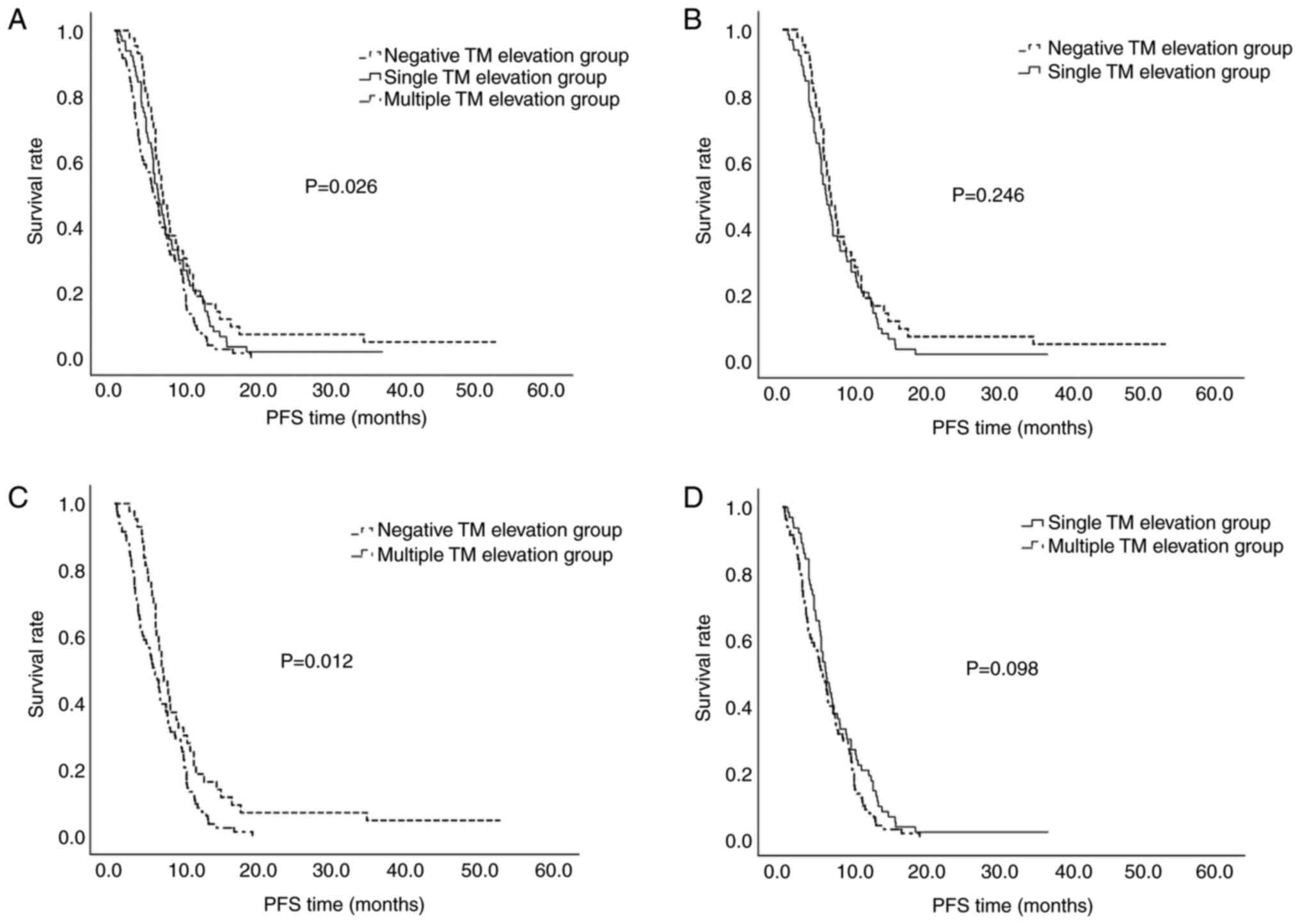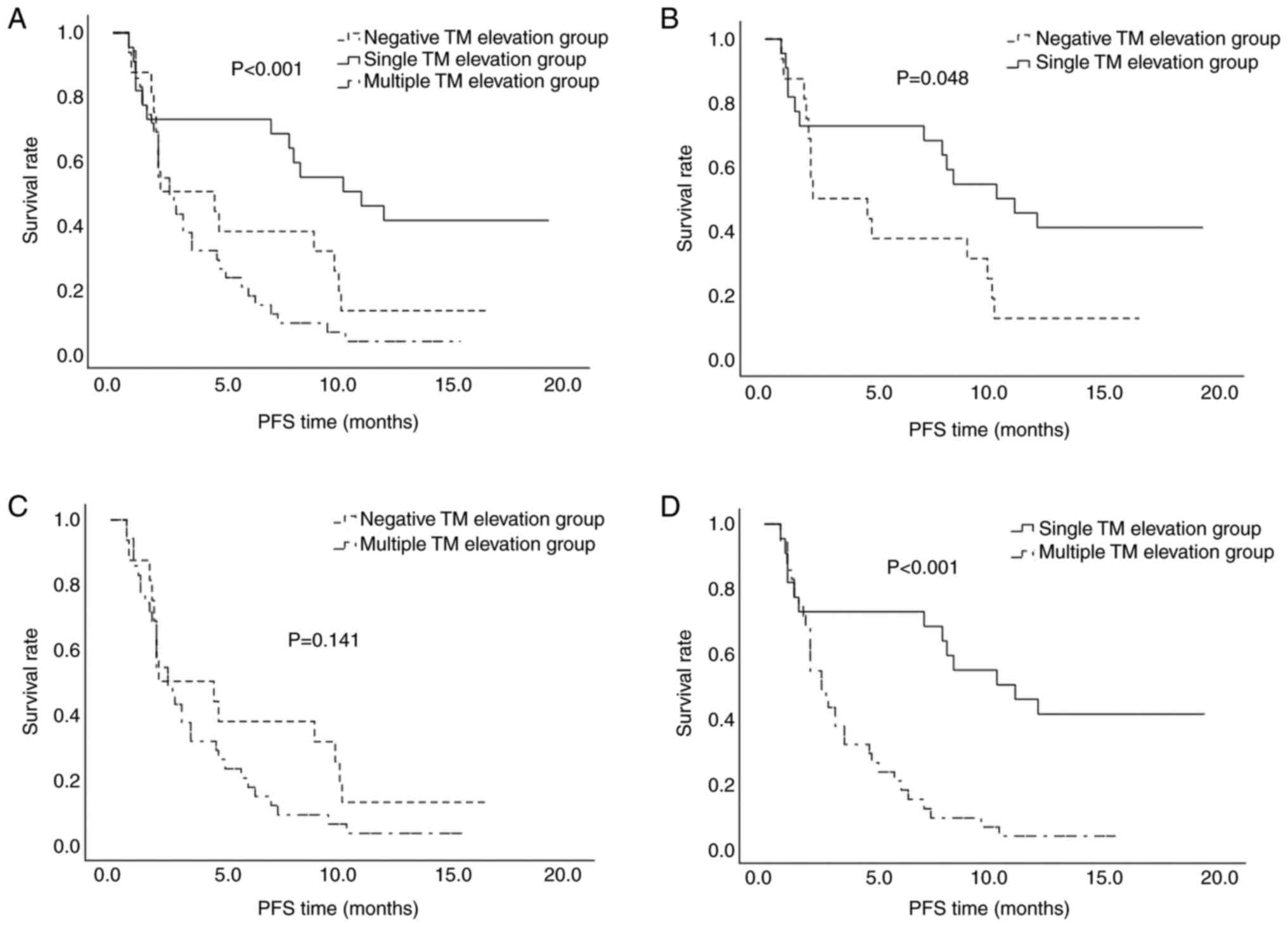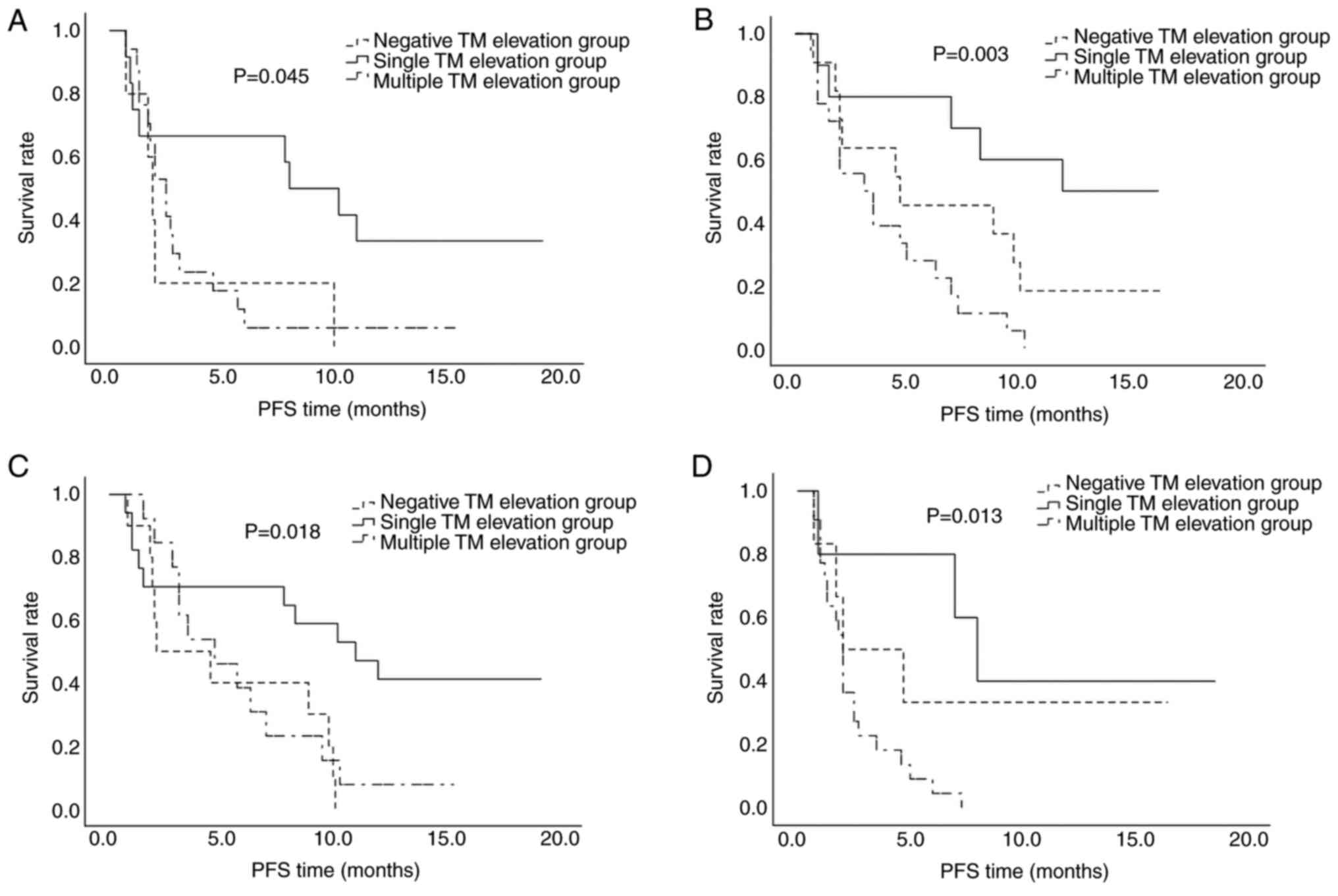|
1
|
Rawla P and Barsouk A, Hadjinicolaou AV
and Barsouk A: Immunotherapies and targeted therapies in the
treatment of metastatic colorectal cancer. Med Sci (Basel).
7:832019.PubMed/NCBI
|
|
2
|
Morris VK, Kennedy EB, Baxter NN, Benson
AB III, Cercek A, Cho M, Ciombor KK, Cremolini C, Davis A, Deming
DA, et al: Treatment of metastatic colorectal cancer: ASCO
Guideline. J Clin Oncol. 41:678–700. 2023. View Article : Google Scholar : PubMed/NCBI
|
|
3
|
Zhou Y, Tao L, Qiu J, Xu J, Yang X, Zhang
Y, Tian X, Guan X, Cen X and Zhao Y: Tumor biomarkers for
diagnosis, prognosis and targeted therapy. Signal Transduct Target
Ther. 9:1322024. View Article : Google Scholar : PubMed/NCBI
|
|
4
|
Zhang C, Qin C, Dewanjee S, Bhattacharya
H, Chakraborty P, Jha NK, Gangopadhyay M, Jha SK and Liu Q:
Tumor-derived small extracellular vesicles in cancer invasion and
metastasis: Molecular mechanisms, and clinical significance. Mol
Cancer. 23:182024. View Article : Google Scholar : PubMed/NCBI
|
|
5
|
Cao Y and Wang X: Effects of molecular
markers on the treatment decision and prognosis of colorectal
cancer: A narrative review. J Gastrointest Oncol. 12:1191–1196.
2021. View Article : Google Scholar : PubMed/NCBI
|
|
6
|
Lorenzi M, Amonkar M, Zhang J, Mehta S and
Liaw KL: Epidemiology of microsatellite instability high (MSI-H)
and deficient mismatch repair (dMMR) in solid tumors: A structured
literature review. J Oncol. 2020:18079292020. View Article : Google Scholar
|
|
7
|
Schrock AB, Ouyang C, Sandhu J, Sokol E,
Jin D, Ross JS, Miller VA, Lim D, Amanam I, Chao J, et al: Tumor
mutational burden is predictive of response to immune checkpoint
inhibitors in MSI-high metastatic colorectal cancer. Ann Oncol.
30:1096–1103. 2019. View Article : Google Scholar : PubMed/NCBI
|
|
8
|
Maio M, Ascierto PA, Manzyuk L,
Motola-Kuba D, Penel N, Cassier PA, Bariani GM, De Jesus Acosta A,
Doi T, Longo F, et al: Pembrolizumab in microsatellite instability
high or mismatch repair deficient cancers: Updated analysis from
the phase II KEYNOTE-158 study. Ann Oncol. 33:929–938. 2022.
View Article : Google Scholar : PubMed/NCBI
|
|
9
|
Azam F, Latif MF, Farooq A, Tirmazy SH,
AlShahrani S, Bashir S and Bukhari N: Performance status assessment
by using ECOG (Eastern Cooperative Oncology Group) score for cancer
patients by oncology healthcare professionals. Case Rep Oncol.
12:728–736. 2019. View Article : Google Scholar : PubMed/NCBI
|
|
10
|
Eisenhauer EA, Therasse P, Bogaerts J,
Schwartz LH, Sargent D, Ford R, Dancey J, Arbuck S, Gwyther S,
Mooney M, et al: New response evaluation criteria in solid tumours:
Revised RECIST guideline (version 1.1). Eur J Cancer. 45:228–247.
2009. View Article : Google Scholar : PubMed/NCBI
|
|
11
|
Masuishi T, Kuboki Y, Terazawa T, Nakamura
M, Watanabe J, Ojima H, Makiyama A, Kotaka M, Hara H, Ohta T, et
al: Exploratory analysis of baseline tumor burden in the TRUSTY
study: A randomized phase 2/3 study of trifluridine/tipiracil plus
bevacizumab versus irinotecan and fluoropyrimidine plus bevacizumab
as second-line treatment in patients with metastatic colorectal
cancer. J Clin Oncol. 40 (4_suppl):S872022. View Article : Google Scholar
|
|
12
|
Hoshino S, Takeuchi M, Kawakubo H, Matsuda
S, Mayanagi S, Irino T, Fukuda K, Nakamura R, Wada N and Kitagawa
Y: Usefulness of Neutrophil to Lymphocyte ratio at recurrence for
predicting long-term outcomes in patients with recurrent esophageal
squamous cell carcinoma. Ann Surg Oncol. 28:3001–3008. 2021.
View Article : Google Scholar : PubMed/NCBI
|
|
13
|
Wang GY, Yang Y, Li H, Zhang J, Jiang N,
Li MR, Zhu HB, Zhang Q and Chen GH: A scoring model based on
neutrophil to lymphocyte ratio predicts recurrence of
HBV-associated hepatocellular carcinoma after liver
transplantation. PLoS One. 6:e252952011. View Article : Google Scholar : PubMed/NCBI
|
|
14
|
Ogino S and Goel A: Molecular
classification and correlates in colorectal cancer. J Mol Diagn.
10:13–27. 2008. View Article : Google Scholar : PubMed/NCBI
|
|
15
|
Grady WM and Carethers JM: Genomic and
epigenetic instability in colorectal cancer pathogenesis.
Gastroenterology. 135:1079–1099. 2008. View Article : Google Scholar : PubMed/NCBI
|
|
16
|
Abolghasemi Fard A and Mahmoodzadeh A:
Unraveling the progression of colon cancer pathogenesis through
epigenetic alterations and genetic pathways. Cureus.
16:e595032024.PubMed/NCBI
|
|
17
|
Keum N and Giovannucci E: Global burden of
colorectal cancer: Emerging trends, risk factors and prevention
strategies. Nat Rev Gastroenterol Hepatol. 16:713–732. 2019.
View Article : Google Scholar : PubMed/NCBI
|
|
18
|
Roshandel G, Ghasemi-Kebria F and
Malekzadeh R: Colorectal cancer: Epidemiology, risk factors, and
prevention. Cancers (Basel). 16:15302024. View Article : Google Scholar : PubMed/NCBI
|
|
19
|
Malki A, ElRuz RA, Gupta I, Allouch A,
Vranic S and Al Moustafa AE: Molecular mechanisms of colon cancer
progression and metastasis: Recent insights and advancements. Int J
Mol Sci. 22:1302021. View Article : Google Scholar
|
|
20
|
Gao Y, Wang J, Zhou Y, Sheng S, Qian SY
and Huo X: Evaluation of Serum CEA, CA19-9, CA72-4, CA125 and
ferritin as diagnostic markers and factors of clinical parameters
for colorectal cancer. Sci Rep. 8:27322018. View Article : Google Scholar : PubMed/NCBI
|
|
21
|
Lech G, Słotwiński R, Słodkowski M and
Krasnodębski IW: Colorectal cancer tumour markers and biomarkers:
Recent therapeutic advances. World J Gastroenterol. 22:1745–1755.
2016. View Article : Google Scholar : PubMed/NCBI
|
|
22
|
Yang AP, Liu J, Lei HY, Zhang QW, Zhao L
and Yang GH: CA72-4 combined with CEA, CA125 and CAl9-9 improves
the sensitivity for the early diagnosis of gastric cancer. Clin
Chim Acta. 437:183–186. 2014. View Article : Google Scholar : PubMed/NCBI
|
|
23
|
Lakemeyer L, Sander S, Wittau M,
Henne-Bruns D, Kornmann M and Lemke J: Diagnostic and prognostic
value of CEA and CA19-9 in colorectal cancer. Diseases. 9:212021.
View Article : Google Scholar : PubMed/NCBI
|
|
24
|
Shan Q, Fan Y, Guo J, Han X, Wang H and
Wang Z: Relationship between tumor size and metastatic site in
patients with stage IV non-small cell lung cancer: A large
SEER-based study. PeerJ. 7:e78222019. View Article : Google Scholar : PubMed/NCBI
|
|
25
|
Zeng WG, Liang JW, Wang Z, Zhang XM, Hu
JJ, Hou HR, Zhou HT and Zhou ZX: Clinical parameters predicting
pathologic complete response following neoadjuvant
chemoradiotherapy for rectal cancer. Chin J Cancer. 34:468–474.
2015. View Article : Google Scholar : PubMed/NCBI
|
|
26
|
Li C, Zhao K, Zhang D, Pang X, Pu H, Lei
M, Fan B, Lv J, You D, Li Z and Zhang T: Prediction models of
colorectal cancer prognosis incorporating perioperative
longitudinal serum tumor markers: A retrospective longitudinal
cohort study. BMC Med. 21:632023. View Article : Google Scholar : PubMed/NCBI
|
|
27
|
Le DT, Uram JN, Wang H, Bartlett BR,
Kemberling H, Eyring AD, Skora AD, Luber BS, Azad NS, Laheru D, et
al: PD-1 blockade in tumors with mismatch-repair deficiency. N Engl
J Med. 372:2509–2520. 2015. View Article : Google Scholar : PubMed/NCBI
|
|
28
|
Le DT, Uram JN, Wang H, Bartlett B,
Kemberling H, Eyring A, Saba Azad N, Donehower RC, Crocenzi TS,
Goldberg RM, et al: Programmed death-1 blockade in mismatch repair
deficient colorectal cancer. J Clin Oncol. 34 (15_suppl):S1032016.
View Article : Google Scholar
|
|
29
|
Overman MJ, Lonardi S, Wong KYM, Lenz HJ,
Gelsomino F, Aglietta M, Morse MA, Van Cutsem E, McDermott R, Hill
A, et al: Durable clinical benefit with Nivolumab Plus Ipilimumab
in DNA mismatch Repair-deficient/microsatellite instability-high
metastatic colorectal cancer. J Clin Oncol. 36:773–779. 2018.
View Article : Google Scholar : PubMed/NCBI
|
|
30
|
Haram A, Boland MR, Kelly ME, Bolger JC,
Waldron RM and Kerin MJ: The prognostic value of
neutrophil-to-lymphocyte ratio in colorectal cancer: A systematic
review. J Surg Oncol. 115:470–479. 2017. View Article : Google Scholar : PubMed/NCBI
|
|
31
|
Kim JH, Lee JH, Lee HS, Shin SJ, Park EJ,
Cho ES, Baik SH, Lee KY and Kang J: Elevated
Neutrophil-to-lymphocyte ratio in perioperative periods is
suggestive of poor prognosis in patients with colorectal cancer. J
Inflamm Res. 14:4457–4466. 2021. View Article : Google Scholar : PubMed/NCBI
|













